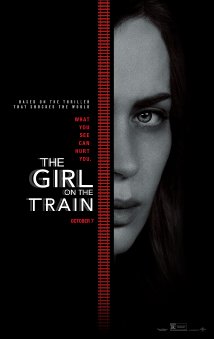The Girl on the Train – 2.5/5 – Movie Reviews by Ry!
 The Girl on the Train 2.5/5 – Murder Mysteries are films that always jolt a mixture of excitement and tension. That combination helps breed a raw feeling for the audience; allowing for the mystery to grow and the ultimate triumph of the truth. When a good film delves into this genre, it exudes great characterization, methodical pacing that ends (sometimes) with a great twist. For all that happens, the purpose is always finding the truth. The Girl on the Train delves into the psyche of certain individuals while paralleling the mysterious murder of a young woman. Even with the potential, the film’s direction brings about an underwhelming experience. The Girl on the Train is a murder mystery that kills itself within its mediocre tale.
The Girl on the Train 2.5/5 – Murder Mysteries are films that always jolt a mixture of excitement and tension. That combination helps breed a raw feeling for the audience; allowing for the mystery to grow and the ultimate triumph of the truth. When a good film delves into this genre, it exudes great characterization, methodical pacing that ends (sometimes) with a great twist. For all that happens, the purpose is always finding the truth. The Girl on the Train delves into the psyche of certain individuals while paralleling the mysterious murder of a young woman. Even with the potential, the film’s direction brings about an underwhelming experience. The Girl on the Train is a murder mystery that kills itself within its mediocre tale.
Premise: A divorced woman becomes entangled within a missing persons case. With much of the timeline a mystery, one woman must find the truth while saving everyone involved with her life.
This film doesn’t have a traditional main character. Within the context of the surrounding ‘Murder Mystery’; you have aspects that focus on different characters at different times. For a full list please refer to the film’s IMDb page. The acting is on par when it comes to these kinds of tales. Across the board, the acting is raw, vigorous and superb. You feel the passion of the circumstance in the ‘main’ characters; especially when they interact with each other in the film. Even for the strength of the acting on the surface, the characters themselves are not well developed. No matter whom the film puts a ‘general’ focus on, you never get a sense of the personal backstory, traits or common connection. This causes a backseat mantra for the audience; where you witness the fictionalized setting of the story instead of living it through the characters. With the secondary cast, they are very one-dimensional. They help prop up the plot points, but do not go beyond being cliché to the themes of the film.
When it comes to the direction, it can be summed up as an abstract mess. From the beginning, the film pushes the themes of the ‘Murder Mystery’ through an abstract of multiple perspectives. From this, the web never weaves in any sort of pattern. Watching this film, you see there’s no sense of connecting important plot points through basic film techniques. With a film focused on a singular murder, it is important to generate a backstory and purpose of each character. From the on-set, it touches (on the surface) the characters’ tale of lust, temptation and lost chances. It tries to build upon the many perspectives of the individuals, but never really explains intent when moving the story through the first act. Once you get to the second act, plot points get maneuvered in what is called the ‘rubber banding’ effect. What happens is that the direction moves through the present timeline, hits a ‘unexplained’ circumstance, then uses a ‘flashback’ to explain the purpose of the specific plot point. The direction basically forces explanations and expositional elements at the expense of the story development. As the direction puts forth a framework surrounding the characters and the murder, you never feel the emotional or dramatic turmoil of the events happening. As the film moves through the second act, the film begins to layer multiple plots. This creates an uneven aspect of the importance of characters; losing focus on the ‘overarching’ thread that was somewhat holding the experience together. Everything that is cliché is used to move the plot along (fate, relationship melodrama, delusional motives, foreshadowing and a MacGuffin). Along with this, the tone goes from general pleasantries to ominous brooding; never really positioning the ‘why’ or ‘what’ is meaningful. All this convolution never allows for the plot to unfold in a graceful manner. Once you get through the fragmented storylines and the ‘back and forth’ timelines, we head into a third act that becomes underwhelming. The obvious ‘twist’ is uneventful, and the climax is a poor reflection of the characters’ purpose caught in the murder of the young woman. The epilogue plays to a ‘look back’ kind of mantra, but it becomes a hollow ending of things that could have been more important.
The visuals are pretty basic. There is nothing that stands out from the general ‘suburban sprawl’ and ‘city life’ complexion. The film just brings a standard play through in a simplistic reflection. This does not hinder the experience. Keeping it basics helps the main points to stay strong (for the most part). The score is also common for the ‘Murder Mystery’ theme. Keeping that low bass sound paralleling with soft ambience helps provide some tension throughout.
The Girl on the Train is a film that had a lot of chances to be great (or even good), but gets lost with too many misfires of the direction and story development. If you are a fan of Murder Mysteries, this might be worth taking a chance. I say at most this is a rental for a night at home.